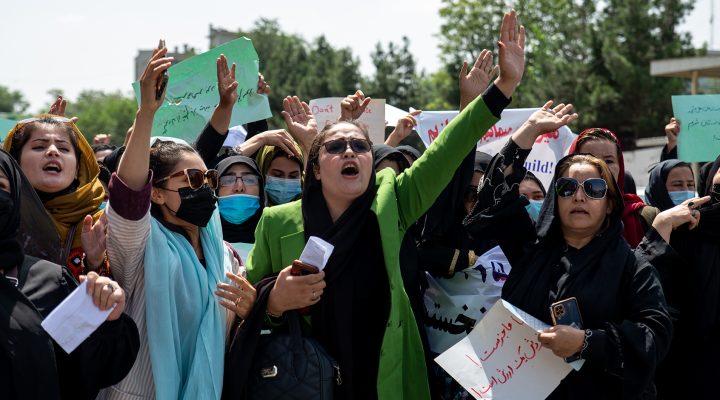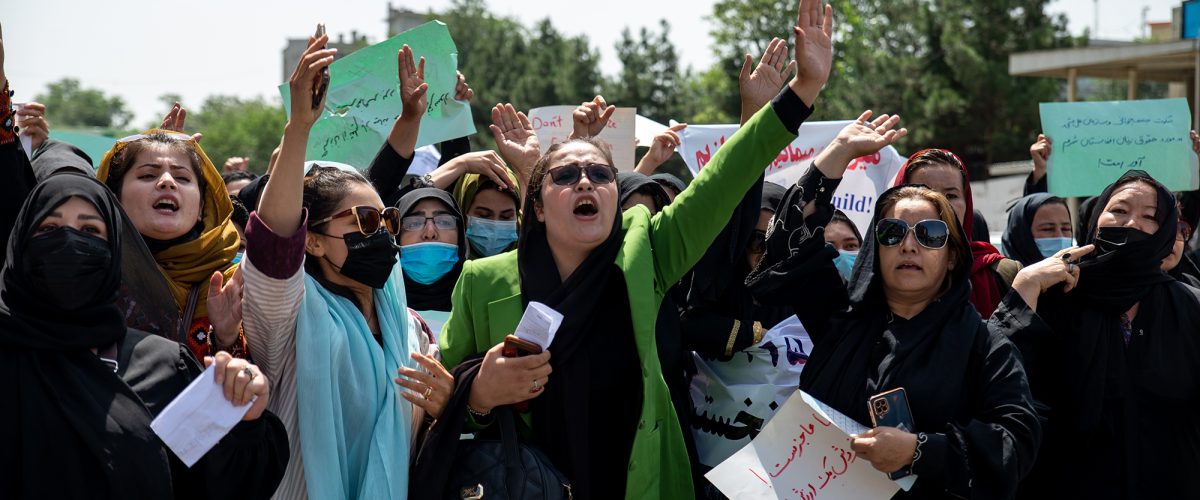Life has gone from bad to worse for LGBTQ persons in Afghanistan during the year since the Taliban took control of the nation, attorney and human rights activist Joseph Azam said.
He spoke during an Aug. 24 webinar hosted by the U.S. Commission on International Religious Freedom.
Azam acknowledged that Afghanistan never has been a safe place for gay, lesbian and transgender people. But the fundamentalist regime now in charge has doubled down on its harassment, torture and killing of LGBTQ people — including by stoning — since its Aug. 15, 2021, takeover.
“As with so many things with the Taliban, they have made sure to adopt the most extreme, the most violent and the most damaging expression as possible.”
“As with so many things with the Taliban, they have made sure to adopt the most extreme, the most violent and the most damaging expression as possible,” said Azam, who came to the United States as an Afghan refugee during the 1980s and now serves as board chair for the Afghan-American Foundation.

Joseph Azam
“We don’t spend enough time talking about (the LGBTQ) community, but it’s important to note that many of these Afghans identify as Muslim. They have deep and meaningful spiritual practices and spiritual lives that have been all but shut down across Afghanistan.”
The USCIRF webinar, “Religious Freedom in Afghanistan: One Year Since the Taliban Takeover,” included a panel discussion that examined worsening oppression of women and girls and religious minorities along with suggested diplomatic actions the U.S. and other governments could take in response.
USCIRF preceded the event with the Aug. 23 release of its latest report on Afghanistan, which details the oppressive and violent treatment of Hindus, Sikhs, Jews, Christians and other minority religious groups, including Shi’a and other Muslims who do not adhere to the Taliban’s narrow interpretation of Sunni Islam and Sharia law.
“In addition, despite continued promises to protect all ethnic and religious communities residing in Afghanistan, the Taliban de facto government has been unable to protect religious minorities against attacks from Islamic State-Khorasan (ISIS-K). While some religious minority communities face the threat of extinction, others struggle to practice their faith in hiding due to fear of reprisal,” the commission said. “Despite publicly committing to change and inclusivity, the Taliban has continued to rule Afghanistan in a similar manner to the way it ruled the country from 1996 to 2001.”

Anne C. Richard
Whether persecuting ethnic and religious minorities or not shielding them from ISIS-K or local hostile communities, Taliban leaders are operating from a fundamental belief that the government should control all facets of Afghans’ lives, said panelist Anne Richard, a distinguished fellow at Freedom House, a nonprofit supporter of global democracy, and former assistant secretary of state for population, refugees and migration under the Obama administration.
“The Taliban regime encourages and incites social hostilities and seeks to hinder all personal rights,” she said. “Taliban leaders intervene in how people should lead their personal lives. No space is considered private.”
And few Afghans are exempt from such treatment, she added. “The Taliban has perversely justified the massive violation of rights in the name of religion, from imposing restrictive rules on women and girls to classifying who true Muslims are. The Taliban regime imposes obedience as a principal value, and the religious hierarchy is the power that moves the country to make any national or international decision.”
Like the LGBTQ community, the effects of the crackdown by Taliban morality police have been particularly oppressive to women and girls in Afghanistan, according to the USCIRF report.
Administered by the Ministry for Propagation of Virtue and Prevention of Vice, that police force has been “particularly harsh toward Afghan women in their enforcement of what they deem as Islamically appropriate dress and behavior. Taliban leaders have issued a series of decrees specifying acceptable behaviors under their interpretation of Islam, particularly targeting women by restricting their freedom of movement, dress, education, participation in sports, right to work and health care.”
In May, ministry police began requiring women to cover their faces in public and to forbid females from wearing colorful clothing, high heels, perfume or any other items considered attractive to men, USCIRF reported. “Furthermore, secondary schools for girls remain closed and will be opened only once the Taliban sets Islamic and cultural conditions for female students aged 12 and older.”

Fereshta Abbasi
Panelist Fereshta Abbasi, a researcher in the Asia division at Human Rights Watch, added that the new regime also bans public socializing between men and women unless they are married to each other. Music is also banned in all public settings. “They are ultra conservative in their interpretation of Sunni Islam.”
Abbasi also noted that the Taliban has repeatedly failed to protect ethnic and religious minorities from attacks by ISIS-K, which operates within Afghanistan: “The armed extremist group has repeatedly carried out suicide bombings and armed attacks against Shi’a communities, and in particular the Hazara,” a minority Muslim sect.
More recent reports revealed that a Sikh temple in Afghanistan was attacked by terrorists who used guns and grenades against worshipers, Azam added. “Things are only getting worse. Groups are either targeted by the Taliban or not provided protection by the Taliban.”

Nury Turkel
The result is that many Afghans have taken their religious beliefs and practices underground or are leaving the country, said USCIRF chair and webinar moderator Nury Turkel.
“Afghanistan’s diverse religious groups have been decimated,” he said. “Religious minority communities indigenous to Afghanistan, including Hindu, Sikh and Jewish communities, have become nearly extinct while others such as Hazara Muslim, Bha’i and Christian communities practice their faith in private in fear of reprisals.”
Turkel agreed with the panel’s suggestion that the U.S. government apply sanctions against Afghanistan and its leaders to force compliance with humanitarian and freedom-of-religion standards.
“Targeted sanctions … work because they hurt,” he asserted. “It sends a message to those bad actors that we see you, we know who you are, we know what you are doing and we will ensure you face consequences.”
Related articles:
The few remaining Christians in Afghanistan live in constant fear — even of their own families


